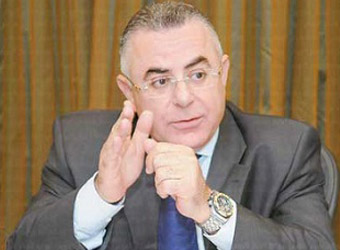Egypt’s central bank governor flew to Abu Dhabi on Sunday to drum up badly needed financial support as cracks appeared within the political coalition that backed last week’s military overthrow of the country’s first elected leader.
The Gulf trip by Hisham Ramez to solicit funds from the oil-rich United Arab Emirates came as the central bank issued an unusual public appeal for Egyptians to deposit donations to a newly opened “Support Egypt” account.
There were also signs that weeks of political unrest had done further damage to the country’s already beleaguered economy and that the instability was far from over.
The central bank announced on Sunday that the country’s foreign currency and gold reserves had dropped to $14.9bn at the end of June, down from $16bn a month earlier and $36bn at the start of the January 2011 uprising against Hosni Mubarak.
Meanwhile, supporters and opponents of the ousted president Mohamed Morsi were again mobilising their forces for another potentially violent duel for popular legitimacy. Street clashes between the rival groups left at least 36 dead and more than 1,400 injured across Egypt over the weekend.
“It’s a critical juncture,” said Angus Blair of the Signet Institute, an economic research think-tank in Cairo. “Given that Egypt is now in a new transitional phase and given that the economy won’t improve until a new cabinet is formed, I am not surprised that the central bank is looking for support.”
Millions of Egyptians of various political stripes poured on to the streets on June 30 to demand the departure of Mr Morsi, a former leader of the Muslim Brotherhood who last year became Egypt’s first elected civilian president. Within days, the nation’s powerful armed forces had removed Mr Morsi, put him and many of his closest allies under arrest and installed top judge Adli Mansour as a caretaker president with a mandate to name a prime minister to oversee a transition toward fresh elections.
But events at the weekend highlighted the complexity of the task Mr Mansour faces after opposition from Islamists in the coalition that backed last week’s coup forced him to rescind a decision to appoint Nobel laureate and former UN nuclear chief Mohamed ElBaradei as his prime minister.
“He is not a politically neutral guy, not a technocrat,” said Nader Bakkar, a spokesman for the Salafi Nour Party. “He was in competition with the Brotherhood. If we choose ElBaradei we cannot convince our people that it was not a military takeover to isolate Morsi to [install] Baradei.”
Mr ElBaradei’s supporters in the Tamarrod , or Rebellion, movement that led the uprising were adamant that Mr ElBaradei be appointed, throwing the process into confusion.
Accounts in the local press also suggested a split within the anti-Morsi camp between liberals and leftists at the forefront of the 2011 uprising and supporters of Mr Mubarak’s regime, who called for participation in the June 30 protests and now demand senior leadership roles.
“There was never going to be an easy ride in terms of picking the presidential team and his cabinet,” said HA Hellyer, an Egypt expert at the Brookings Institution. “ElBaradei would be divisive when what this country needs is for people to calm things down and bring people together as much as possible.”
The United Arab Emirates, which pledged $3bn in aid for Egypt in 2011 but never disbursed any, and Saudi Arabia have been the principal foreign backers of overthrowing Mr Morsi. One Egyptian official was cited by local media at the weekend as saying that Riyadh had agreed to a $500m loan to Egypt.
Qatar had been one of the biggest foreign backers of Mr Morsi and his Brotherhood, having pledged some $8bn in aid to his government. It was unclear if Mr Ramez would be travelling to Doha.
Source: Financial Times


